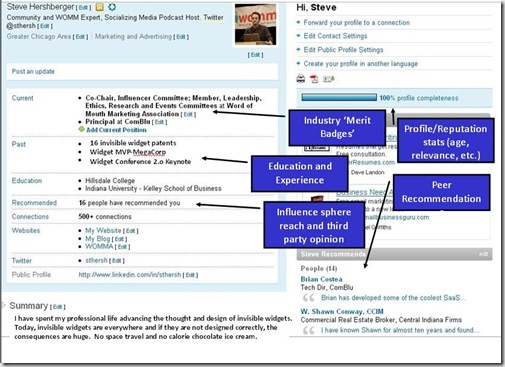If you had a great reputation as an expert in something, you probably worked hard to earn it. Doesn’t matter if its computers or cooking.
What if that reputation didn’t matter? What if every place you went was like the first day of school? You had to start over to build your street cred.
Just imagine, you work for MegaCorp and you are MegaCorp’s resident expert in say, invisible widget design. Inside the four walls of MegaCorp, noone was allowed to develop invisible widgets without following your guidelines. And, because of your rockstardom in invisible widget design, the company’s culture was to not even think about invisible widget design without at least bouncing their idea off of you. For you, life’s pretty good at MegaCorp.
Now, imagine MegaCorp is bought by a rival. The rival has some really smart experts from Sweden you’d love to collaborate with, dream come true, right?
So what if none of the work you’ve done at MegaCorp can be accessed by the Swedes? What if they can’t verify your bleeding edge work? What if they have to simply take your word?
Worse yet, what if because you can’t be vetted as an expert, you can’t get access to the Swede’s email or phone list? Nobody will give it to you. The Swedes are very protective of their experts.
You can’t find them and they don’t even know you exist. So, you work and work and work to make contact and work some more to prove you are as smart as they are. After all, all you want to do is collaborate, right? Well, after a lot of hard work, you achieve your goal and the Swedes will talk to you. Shortly after all of this, you learn of a new Ninja Master in invisible widgets. He’s in Japan. Again, you reach out to introduce yourself and invite him to work with you and the Swedes on the next new thing…Nano Widgets, invisible of course.
The Japanese Ninja Master of Invisible Widgets has never heard of either you or the Swedes. Not interested unless you can prove to him you are worthy. So, you start again.
From him, you hear of a conference in Moscow on the very topics you know cold. Keynoting is a must and should be a lay-up.
The conference organizers have never heard of you. So you offer up some referrals but the conference organizers have never heard of either the Swedes or the Japanese Ninja Master. Feel free to come and listen but no access to the real thought leaders, all of which are from Brazil, Canada and of course, Luxemburg they tell you. You go, but you are sure you won’t get as much out of the conference as you might have otherwise if you’d be recognized as an expert.
After a while you are spending as much time reinventing your reputation as you do plying your trade. It gets tiresome and frankly isn’t worth it, so you retreat from new places where you aren’t recognized and just interact with your small community of peers…who know you and you them.
This somewhat silly example isn’t really so silly. It spotlights the very real weakness of today’s social sphere. Today, reputation isn’t portable beyond the four walls of any community and that’s the social web’s Achilles’ heel. A SME (Subject Matter Expert may recognized as an expert in one place but not another).
Right now, the social web is essentially a large group of city states with roads in between. Sure, you can travel from one community and website to another but rarely if ever, the reputation you work so hard to develop in one doesn’t really follow you anywhere you might want to go. See the problem?
And, reputation within any group of users is increasingly important. Why?
Two facts.
Two. Massive swaths of UCG that we encounter are Trojan Horses for malware.
Would any of you click on a blog or forum reply that says ‘Here is a better way:
http://www.lucktec.ru/web&hl=en&ei=Lsp7TM7uG4LAsAO938iCBw&start=10&sa=N
Probably not.
Back to my MegaCorp example. Imagine the above imaginary link I share is posted in a forum for Brazilian experts in Widgets who focuses entirely on pushing the envelope in Invisible Widget design. The link takes you to a video of a question you posed to a speaker at the Russian Conference you attended and the bleeding edge conversation that ensued between yourself and the keynote speaker in which he took notes.
Imagine the video was posted by one of the Brazilian experts who was there and by clicking on his name, you were able to see a universally accepted profile, with all the appropriate ‘merit badges’ he’s earned over the life of his career and the opinions of others (a lot like you see in LinkedIn) you’d probably be a lot more comfortable in clicking a link you don’t recognize.
Being able to quickly quantify someone’s expertise and value would make the social web a much more effective collaborative environment.
 .
.
Incredible advances are currently being made in the areas of social web Listening and metrics. However, reputation portability innovation is sorely lacking.
It needs to be a focus for the web to stay on track as a useful, healthy and safe place to collaborate for all users.

